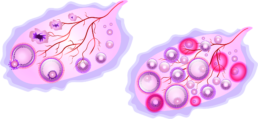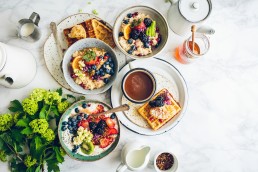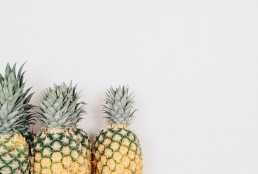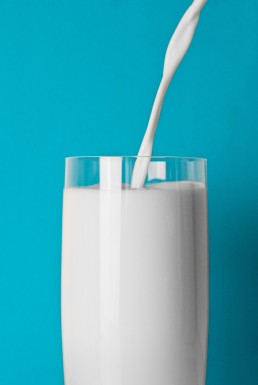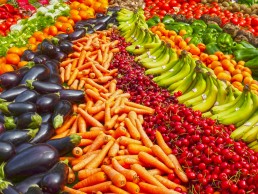The low-down on PCOS
WHAT IS IT?
Polycystic Ovaries Syndrome (PCOS) is the most common female disorder of the endocrine system. The symptoms can be varied but are connected by an underlying hormonal imbalance and almost always an excess of androgenic hormones. ‘Polycystic’ ovaries contain several small follicles which have not matured for ovulation, unlike regular ovarian follicles. These follicles are referred to as ‘cysts’ (though, confusingly, they are not actually cysts!) To add to the confusion, not everyone with PCOS has polycystic ovaries – and not everyone with polycystic ovaries has PCOS.
There are actually four different types of PCOS (I have an article dedicated to this):
- Adrenal PCOS
- Inflammatory PCOS
- Post-pill PCOS
- Insulin-resistant PCOS
HOW DO I KNOW IF I HAVE IT?
You need a doctor’s diagnosis to confirm PCOS. A doctor will usually run various blood tests (testosterone, Leuteinizing Hormone, Follicle-stimulating Hormone, prolactin, Thyroid-stimulating hormone, sex hormone-binging globulin) as well as pelvic ultrasounds to look for enlarged ovaries or ‘cysts’ on the follicles.
COMMON SYMPTOMS
- Irregular, absent or long menstrual cycles
- Anovulation (meaning ovulation doesn’t occur)
- Hirsutism (excess facial or body hair) or hair loss
- Difficulties managing weight
- Low mood and low self-esteem
- Acne
MISCONCEPTIONS
There are several common misconceptions with PCOS. The first is that it makes you infertile – or that you will struggle to get pregnant. Neither is necessarily true. Firstly, PCOS affects women differently, and secondly, it is usually the hormonal imbalance associated with PCOS that affects fertility – and the great news about that is that there is a lot that can be done through diet, lifestyle and supplements.
It is also often assumed that PCOS predominantly affects the ovaries but it actually affect the whole body, including the adrenals, digestion, insulin management and inflammation. This is why I take a holistic approach to PCOS clients – I look at the individual, their health history and their unique experience with the syndrome. We work together, step-by-step, to support the whole body using functional testing, diet and lifestyle changes and supplements.
NEXT UP: THE FOUR TYPES OF PCOS
How to improve your egg quality
Women are born with all the eggs they will ever have. If you think about it, if a pregnant woman is carrying a girl she is not only carrying her own baby but also all the eggs that might one day become her grandchild!
Some of my clients come to me with test results showing that they have low ovarian reserve, which indicates that there are few eggs. I like to remind these women that it only takes one good quality egg – and the good news is that there’s plenty you can do to improve yours. (N.B. let’s not forget the boys, the same is true for sperm!)
The importance of egg health is why I prefer to see clients at least 3 months prior to trying to conceive, or prior to assisted fertility treatments because it takes around 90 days for an egg to mature. That’s 90 days to give yourself the best possible chance.
My top five tips? Surprisingly simple!
- A diet high in protein such as lean meat and plant proteins, with limited dairy (if tolerated) and fish.
- Plenty of fats such as oily fish (twice weekly), extra virgin olive oil, avocadoes, nuts and seeds.
- Limit refined sugar.
- Try to reduce stress – though I appreciate this is easier said than done if you’re struggling to conceive! Try to add in some stress-relieving activities into your daily routine such as baths, yoga, meditation, being in nature – or whatever works for you.
- Limit caffeine and alcohol.
- Bonus tip – absolutely no smoking!
There are also several supplements I often use in clinic to specifically target egg quality but these will differ from woman to woman as everyone’s needs are slightly different. Please do get in touch if you’d like some personalised advice on how to support your fertility.
The missing ingredients in your fertility supplement
There are three key things that might be missing in your fertility supplements and they’re all essential for a healthy pregnancy. Sadly, the ‘number one’ brand recommended to women is missing all of them – but remember that all of these apply to men too.
- FOLATE. It’s recommended that women trying to conceive and during the first trimester of pregnancy reach an intake of 400mg folic acid and almost all prenatal supplements contain exactly that – folic acid. So what’s the problem? Well, many women can’t convert folic acid into the active form used into the body. It is possible to genetically test whether or not you fall into this category, but understandably most women won’t be doing that. So my advice is to opt for a prenatal supplement which contains folate instead of folic acid. Folate is much more available to the body.
- CHOLINE. Choline is another essential nutrient during preconception care and pregnancy, contributing to the healthy development of a foetus. You can get it from your diet (eggs are a great source!), but we need more of it during pregnancy and when trying to conceive, and a lot of prenatal supplements don’t contain enough, if any.
- ENOUGH OF EACH NUTRIENT. You might require more of a certain nutrient than somebody else, or simply more than a particular fertility supplement provides. That's why it's so important to pick one that is right for you. For example, some of my clients need more zinc magnesium, whilst others need a supplement without iodine, iron or B12. It depends on your physiology, your genes, and your health concerns.
- NUTRIENTS WE CAN ABSORB. The other problem I see with many prenatal supplements is that many of the nutrients are not in forms that are most ‘bioavailable’ to the body, meaning that sometimes they can end up being little more than expensive urine! My personal preference is to opt for food-grown supplements where possible – although it is important to check that these have the correct levels you need. Remember, depending on your unique body, your diet and your lifestyle, you might need more/less of certain nutrients than others.
Breakfast
I love breakfast! Not only for breakfast foods but because it’s an opportunity to start your day off on the right foot.
It really does matter what we eat for breakfast though. Eat the wrong thing and you could be setting yourself up for a day feeling anxious, tired, unable to concentrate and craving quick fixes to boost your energy levels – hello biscuit tin!
Ironically, some of the most stereotypical breakfast foods are some of the worst culprits – but I have some ideas on how to easily adapt them to help you feel energised and focused throughout the morning until your next chance to nourish yourself!
Remember – the key to sustained energy is a balanced plate or bowl:
• Protein (slowly digested, releases energy slowly)
• Fat (even more slowly digested, releases energy slowly, very satiating)
• Complex carbohydrates (slowly digested, releases energy slowly, nutritious – as opposed to refined carbohydrate which has largely been stripped of nutrition and releases energy very quickly, causing it to fall very quickly too) Generally speaking, this means wholegrains, brown carbohydrates, minimally processed rather than white carbohydrates and processed foods.
• Fibre, antioxidants and phytonutrients from vegetables and fruit
Here are some typical breakfast foods and some more nutritious alternatives (N.B. I’m not saying you need to always choose a nutritious alternative, just giving you some options!)
CEREAL
• Often high in sugar.
• Often predominantly refined carbohydrate.
• Recommended portion sizes are a lot smaller than what most of us would pour into our bowls!
• No protein or fat and limited micronutrients.
INSTEAD: low sugar granola, with berries and unsweetened live natural yoghurt
• Granola is complex carbohydrate, fat and protein (if it contains nuts and seeds)
• Berries provide extra fibre, antioxidants and micronutrients
• Yoghurt provides protein and friendly gut bugs
STORE-BOUGHT OR PACKAGED SMOOTHIES (this includes from ‘healthy’ food delivery services)
• Often almost entirely fruit which makes them very high in sugar (please note, fruit is fantastic – but not several portions glugged down in one go)
• Even ‘green’ smoothies which list mostly vegetables with only one fruit (e.g. apple) tend to be mostly made up of that one fruit.
INSTEAD: home-made smoothies following these principles (I have some recipes if you want some examples):
• One portion of fruit
• One or more portions of vegetables
• Protein (e.g. yoghurt, protein powder, nuts and seeds)
• Fat (e.g. nuts and seeds, avocado, full fat yoghurt)
• Complex carbohydrates (e.g. oats)
TOAST WITH BUTTER AND MARMITE/JAM/HONEY
• White bread is a refined carbohydrate (little fibre, little nutrition)
• Jam and honey are also refined carbohydrates
• No protein
• No/limited fibre, micronutrients
INSTEAD: wholemeal, rye, millet or sourdough bread with nut butter and fruit (e.g. rye bread with almond butter, topped with banana)
• Wholemeal, rye, millet or sourdough breads are complex carbohydrates, high in fibre and nutrients
• Nut butter is a source of protein and fat
• Fruit is a source of fibre, antioxidants and phytonutrients
OR: wholemeal, rye, millet or sourdough bread with eggs, spinach and smoked salmon
• Wholemeal, rye, millet or sourdough breads are complex carbohydrates, high in fibre and nutrients
• Eggs are a source of protein and fat (and are nutrient powerhouses!)
• Spinach provides fibre, antioxidants and phytonutrients
• Salmon provides protein and fat (wonderful source of omega 3 fatty acids!)
PASTRIES
• High in saturated fats
• High in sugar
• Low in nutrients
INSTEAD: banana pancakes with greek yoghurt and blueberries
• Banana and blueberries provide fibre, antioxidants and phytonutrients
• Green yoghurt provides protein and fat
• Eggs provide protein and fat
• Oats provide complex carbohydrate (assuming you use oats in the pancakes – if not, quinoa, coconut or buckwheat flour are nutritious alternatives!)
Of course, there are mornings that cry out for a pain au chocolat or a slice of toast slathered in butter and dolloped in marmite and there is nothing wrong with that once in a while – I really believe that sometimes you just need to eat something good for the soul! BUT, on a busy day where you need to be on your ‘A-game’ you might want to try out some of my alternatives.
If you’re interested in reading more about how to maintain energy levels throughout the day I have a post all about blood glucose levels here.
I’m always happy to chat to anyone about nutrition so as always, please do feel free to get in touch with me about any questions you might have: laura@lmnutrition.co.uk
Why choose me over google?
There is a vast amount of information about nutrition available to us all but it can be overwhelming and very confusing. How do you know what to trust, whether or not it will work for you and what’s worth spending money on or what’s just a fad? How do you wade through the millions of opinions out there?
Who is giving the advice? You’d be surprised at how many big names in the health and wellness industry actually have no nutrition qualification. Or a qualification from a weekend course or part of a personal training programme, rather than YEARS of science-based nutrition studies.
The other thing to consider is that the internet does not know YOU.
- If you and I ate exactly the same thing for a month, we would not be in exactly the same state of health.
- If you and someone with exactly the same health symptoms as you ate exactly the same thing for a month, you still wouldn’t be in exactly the same state of health.
- If you and someone who weighed exactly the same as you, was exactly the same height, had exactly the same body fat percentage, activity levels ate exactly the same thing for a month, you STILL wouldn’t be in exactly the same state of health.
Why?
We have different lifestyles, activity levels, mental health, gut flora and genes.
All of these things mean that what you eat, and how you respond to foods, is unique to you and THAT is why Nutritional Therapy is a thing!
Influencers, personal trainers, your friends – none of these people are qualified to give YOU health advice (unless they actually are, of course!).
(Side note – recommending that people take supplements can be downright dangerous unless you know all the details about their health so PLEASE don’t buy supplements you’ve seen advertised on instagram).
So how am I different? (this involves a little bit of bragging but bear with me!)
Well firstly, I spent 4 years studying nutrition – and that’s after getting two degrees from Edinburgh and Yale and starting a PhD at Oxford in a totally unrelated field first! Basically, academic learning is my thing. Trawling through scientific evidence is a hobby. You can trust me to leave no stone unturned in researching your case – and to enjoy every second of it!
I’m also qualified and registered under two governing bodies (BANT, CNHC) which means I have to adhere to their rules, ethics and criteria. This includes continued education because nutrition is an evolving field. It also means that all your notes and our consultations together are confidential.
Secondly, if I had two clients with identical health goals, I guarantee you they would not walk away with the same generic plan.
- I spend 2 hours researching your specific case.
- I use science to support everything I recommend.
- I check, double-check and triple check that everything I recommend is safe.
- I find out what your symptoms are, in great depth.
- I find out what medication and other supplements you’re taking (if any).
- I find out what your family history is – are there any predisposing factors to consider?
- I find out what your lifestyle is like – how active are you? Who does the cooking in your house? Do you avoid certain foods for religious/cultural reasons? Do you have time to cook or do you need options readily available? Do you eat out a lot? Do you eat at home? Do you eat at the office?
- I find out what you like! This is SO important! I want to help, not make you miserable by telling you to eat a load of stuff you hate!
- I support you. My packages all include regular check-ins and email support.
- I work around you. Don’t have the budget for testing? No problem, we’ll work around it. Don’t want to take supplements? Fine – we can stick to food. Hate pills? That’s ok, I’ll find you a liquid alternative.
- I know my limits. Contrary to the popular saying – food is NOT medicine. Sometimes a client needs actual medicine, and care from someone who is medically trained. Sometimes a client needs a specialist. Sometimes a client needs a little extra support from a mental health professional. If I think you’d be better off in someone else’s hands I’ll help you to find someone more suitable.
The bottom line is that unlike the internet, I get to know you – and can recommend nutrition that is tailored entirely to you.
Still not convinced? Get in touch and let’s arrange a chat – free of charge and no obligation to book. laura@lmnutrition.co.uk
Tips for acne and breakouts
Acne and breakouts are not just a teenage phenomenon but affect many people later in life too – including me! With the potential to affect mental health as well, I really encourage anyone struggling with skin concerns to speak to a professional because there is often something that can be done to help. There is a lot more you can do with nutrition than I can explain in this blog post so please do get in touch if you’re struggling, or speak to a dermatologist or, of course, your GP.
My first tip is to find the root cause of your acne or breakouts. Is it hormonal? It is due to your digestive health? Is it an intolerance? Is it stress? The problem is that you can eat a ‘perfect’ diet but if you’ve still got imbalances going on at a cellular level, it’s going to be really hard to improve your skin.
Now onto the nutrition tips!
- Vegetables (yes, I know, this is my top tip for pretty much everything!)
Simple and effective. Eating more vegetables (aim for at least 7 80g portions each day) will increase the fibre in your diet, and fibre is essential for helping to bind up toxins that might otherwise find their way out through another detoxification organ… your skin! Acne and breakouts can often be linked to poor toxin elimination. Fibre is also fantastic for your gut bacteria – we’ll come to those guys a bit later. Veggies are also a fantastic source of anti-inflammatory compounds and antioxidants which help to limit damage to cells from free radicals and repair the skin.
- Don’t be afraid of fats.
Fats have been unfairly demonized but they are essential for skin health. Not only that – they are the building blocks for sex hormones such as oestrogen, progesterone and testosterone, as well as stress hormones like cortisol. Why is that important? A really common factor in acne and breakouts is an imbalance in hormones. Do you ever notice more blemishes around your period? Or breakouts when you’re in the middle of exams or a busy time at work? You can thank your hormones! Eating plenty of healthy fats can help to balance those pesky hormones – nuts and seeds, avocado, olive oil and oily fish (e.g. salmon, mackerel, anchovies, sardines, herring) are great sources.
- Balance your blood sugar levels.
Have you ever been told that chocolate causes spots? Well that’s not strictly true. Neither is the saying that sugar causes spots. What might cause them is imbalanced blood sugar (which admittedly can be caused by eating too much chocolate and sugar!) Three balanced meals each day, including some protein, some fats, some complex carbohydrates and plenty of vegetables is the simplest way to keep your levels balanced. Processed snacks (like biscuits, cake, crisps) and fizzy drinks other than water are likely to knock them out of balance. For some people, caffeine has that effect too.
- Look after your gut.
There is a scientifically proven link between your gut and skin. The bacteria in your gut can communicate and even influence your skin – meaning that if they’re not happy, it’s quite likely that it might show up on your face! On the other hand, a healthy gut flora can be anti-inflammatory, reducing signs of acne and breakouts. Prebiotics and probiotics are a great way to help the friendly strains of bacteria – but I always advise caution with these in anyone who has any gut symptoms as they can sometimes exacerbate them. Prebiotic foods feed the bacteria and include asparagus, onion, garlic, unripe bananas, Jerusalem artichoke. Probiotic foods contain live bacteria and include live yoghurt, kombucha, kefir, miso, natto, tempeh, sauerkraut and kimchi.
- Support your liver.
One causal factor involved in acne and breakouts – particularly later in life, can be an overburdened liver. The skin is a really important organ for detoxification so if you’re consuming a lot of toxins from your diet and environment your skin might well react. Examples of toxins are alcohol, excess caffeine, pollution, chemicals and fumes, pesticides, additives. There are certain supplements I often use to support the liver, but drinking plenty of water (see below) and eating plenty of bitters (e.g. watercress, rocket, dandelion, chicory) and cruciferous vegetables (e.g. broccoli, brussels sprouts, mustard greens) can support liver function too.
You’ve probably heard this one before but I can’t write a post about acne and breakouts without mentioning it! Keeping yourself well-hydrated should keep your skin well-hydrated – which means potentially less oil production. It is also essential for detoxification – see above.
Whilst these tips can be a useful starting point, supporting the imbalances that are at the heart of acne or breakouts are really the key to improving your skin. There are also some key nutrients that can be useful to take in supplement form short-term. Please do get in touch with me if you’d like to discuss your skin concerns – not only can I offer you some personalised nutrition support, I can also offer understanding because I have experience of these conditions myself. laura@lmnutrition.co.uk
Dairy myth-busting
Dairy is one of the most nutrient-dense food groups and most health guidelines worldwide recommend including it in our diets each day. Together, the vitamins and minerals in dairy products can help to keep your brain, skin, bones, nerves, teeth, blood pressure and immune system healthy. So why has it got such a bad reputation? Keep reading for some dairy myth-busting.
(Please note that I am aware of the ethical and moral arguments against dairy – but for the purpose of this blog I am concerning myself with solely the nutritional arguments.)
MYTH 1: In the 1970s fats in food became the enemy – the ‘low fat’ trend began and consequently dairy became less popular.
This is outdated thinking and it is a myth that ‘fats make you fat’. We NEED fats in our diets for skin health, hormonal health, brain health, immune health… the list goes on. Low fat alternatives often contain more sugar to make up for the flavour lost by removing the fat and I would argue that the sugar content is potentially more damaging to health. Fats have a higher calorific value than protein and carbohydrate so of course, we need to consume them in moderation - but they are also more satiating. Dairy contains fat and protein along with an excellent nutrient profile which means that even a small amount gives you a lot of bang for your buck!
MYTH 2: diary is the culprit.
Dairy intolerance IS a thing and some people really do need to avoid it – a small number are even allergic to components of dairy. But blaming dairy for digestive, skin or any other symptoms without being sure can be problematic because it might mean that other underlying causes are ignored. I have had several clients who thought dairy was causing their problems, but after several months of nutrition protocol were able to consume it again with no problems. Cutting out an entire food group should not be undertaken lightly - check that that is what is actually causing the problem by trying an elimination challenge with support from a qualified nutrition practitioner.
MYTH 3: dairy is inflammatory.
The inflammation argument is linked to the saturated fat content of dairy (also found in coconut oil). Yet again, this is outdated research. Recent research has found that in individuals without diary intolerance or allergy, it can actually have a small anti-inflammatory effect!
MYTH 4: dairy causes acne.
The problem here is that many of the scientific studies reporting a link between dairy and acne cannot isolate dairy as the primary cause – there are so many other potential factors. It may be that over-consumption exacerbates acne. Fermented dairy products such as kefir, yoghurt and unpasteurised cheese contain bacteria that might actually help acne.
MYTH 3: plant-based products are dairy ‘alternatives’
Plant-based milks and dairy ‘alternatives’ are delicious but they simply cannot offer the same nutrient profile as dairy – in my opinion, they cannot be considered alternatives. Not a problem if you just enjoy the plant milks for what they are, but a bigger problem if you are using them as a direct swap because you could be missing out on some really important vitamins and minerals. My advice would be to buy fortified versions which contain added vitamins and minerals – but do be aware that they still won’t contain the same protein content as dairy (and many are predominately simple carbohydrate and water).
It has been claimed that milk cows are pumped full of hormones.
Milk cows are not pumped full of hormones in the UK and there are EU laws that regulate this (fingers crossed this remains the case post-Brexit). There may be a small amount of hormones in dairy products but these are only those that are naturally present. My advice is to choose organic dairy products when possible to minimise the risk of any unwanted ‘added extras’ in your dairy.
The bottom line?
Whilst some people genuinely cannot tolerate dairy, for many people it is a highly nutritious component of their diet and cutting it out entirely could do more harm than good. The key (as with so many aspects of nutrition) is moderation – in much of the research it is over-consumption of dairy that is linked to problems. If you do want to remove dairy from your diet for whatever reason, make sure you do so with a good understanding of how to replace the nutrients you would otherwise get from it. Speak to a qualified nutrition expert (like me!)
Keep your eyes peeled for another blog exploring the nutrients in dairy in more depth, along with some more comprehensive information about dairy intolerance.
Ten tips to help you eat more veggies
Vegetables are all superfoods in my opinion, and one thing I’ll ask almost all my clients to do is to eat more of them! Here are my top ten tips to squeeze more vegetables into your daily diet.
- Smoothies are the easiest way to get 3 portions (or more!) for fruit and vegetables in at breakfast. When doing my 10 a day challenge I found it much more difficult on the days where my breakfast was lacking in portions. Berries, banana, avocado, frozen kale, spinach and broccoli are my favourite smoothie additions.
- Frozen fruit and veggies save a lot of time and cleaning up! They’re usually just as nutritious – if not more because they’re frozen soon after picking whilst supermarket vegetables could have been picked several days ago.
- Preparation is key! Batch-cooking and chopping makes it so much easier – when I was short on time I probably would have given up my 10 a day challenge if I hadn’t had fruit and veg already prepared and ready to eat.
- Have a plan – and stick to it. I often tell my clients to set themselves up for success by spending a little time at the weekend planning their meals for the week and shopping.
- Get fancy and have a veggie starter! Nothing major – a small bowl of soup or a bitter leaf salad will help you add in some extra veggies and as a bonus will kick-start your digestion.
- Take it slow. If you’re not used to eating a lot of vegetables increase your portions gradually. They’re full of fabulous fibre, but this can make some people feel a little bloated or gassy if not used to it.
- Variety is key! We all know the food rut – I definitely fall into it now and then. Ideally, we want a wide range of antioxidants, polyphenols and phytochemicals from plants so try to mix it up a bit and your body will thank you for it.
- Use herbs and spices to add flavour. If you’re catering for a fussy eater in the family this can help to hide some veggies or make them a little more appealing.
- Get sneaky – another one for the fussy eaters. Grate courgette or finely chop mushrooms into sauces and add frozen veggies into smoothies – believe me, if they’re frozen you’ll hardly taste them. This works a charm on my husband!
- Go plant-based. I eat meat and fish each week – they’re highly nutritious. However, most of my breakfasts, lunches and several of my dinners are vegetarian which automatically boosts my daily intake of fruit and vegetables.
I really hope you’ve found these tips useful and that you enjoy upping your vegetable intake! Please do get in touch with me if you’d like any advice or have any questions at laura@lmnutrition.co.uk
Snacking 101
When I first developed an interest in nutrition, it wasn’t uncommon to be told that several smaller meals throughout the day were beneficial. The tides have begun to turn, however, and science is now telling us that in a generally healthy individual there are many more benefits to having three, well-balanced and satisfying meals each day, with a window of 4-6 hours fasting in between.1,2 More frequent eating can result in dysregulation of blood glucose, increased fat storage and even increased risk of metabolic disease.2 Regular fasting between meals (i.e. that 4-6 hour window) is now thought to potentially improve circadian rhythm (your sleep-wake cycle), improve stress resistance, improve modulation of the gut microbiome and reduce inflammation.
So what to do if you’re a hardcore snacker?
My first tip would be to make sure that you have three balanced meals, regularly spaced throughout the day. Include some protein, some complex carbohydrates, some good fats and some vegetables. The macronutrients and fibre in a meal like this will give you your best shot at avoiding hunger and cravings between meals.
However, scientific studies don’t take into account the nuances of life so we need some wiggle room! There are times when you might actually need to snack - for instance if you’ve done a lot of exercise or if your schedule has unexpectedly made you miss a meal or eat later than planned.
This leads me to my second tip - if you're going to have a snack, eat it, enjoy it and be done with it! Don't graze throughout the day. Whist a snack when needed is nothing to worry about, constantly picking at food throughout the day will not be doing you any favours. Think of it as though you're trying to get some work done but every half hour someone keeps calling you - you won't be able to get on with what you need to do. Similarly, if you're constantly eating, your body (and gut specifically) can't get on with what it needs to be doing to function optimally.
Thirdly, make sure that if you do snack, your snacks are protein-based and unprocessed. Junk food might satisfy your cravings but high sugar, high saturated and trans-fat snacks will dysregulate your blood sugar and will leave you hungry and craving more shortly afterwards.
Here are some of my favourite, balanced snacks to recommend to clients – most of which are quick and convenient:
- Apple slices dipped in a small tablespoon of nut butter.
- Carrot sticks dipped in hummus (bonus points if the hummus is home-made).
- Smoothie – check my recipes for some ideas!
- Protein shake – choose your protein powder wisely – look for minimal ingredients and nothing ending in -ose! Brands I like are Nuzest, Purition and Pulsin.
- Oat cakes and cottage cheese, or a vegan alternative.
- Mixed nuts and seeds – I sometimes roast them for extra yumminess.
- Greek yoghurt and berries.
- Celery sticks dipped in cream cheese, or a vegan alternative.
- Kale or cavolo nero chips – I have a delicious cheesy cavolo nero crisp recipe!
- A couple of squares of 85% dark chocolate dipped in almond butter.
- Edamame beans.
- Hard boiled eggs dipped in a little paprika.
- Leftovers! Snacks don’t have to look like conventional snacks – I quite often have a few bites of last night’s dinner if I get peckish between meals.
References:
- Paoli A, Tinsley G, Bianco A, Moro T. The Influence of Meal Frequency and Timing on Health in Humans: The Role of Fasting. Nutrients. 2019;11(4):719. Published 2019 Mar 28. doi:10.3390/nu11040719
- Piya, M., Reddy, N., Campbell, A., Hattersley, J., Halder, L., Tripathi, G., Tahrani, A., Barber, T., Kumar, S. and McTernan, P., 2014. Meal size and frequency influences metabolic endotoxaemia and inflammatory risk but has no effect on diet induced thermogenesis in either lean or obese subjects. Endocrine Abstracts,.
The Game Changers
This is the Netflix documentary that everyone seems to be talking about. I have a lot of opinions on a lot of the documentary but I’ve narrowed them down to three key points:
- I’ve had several people tell me they’ve ‘gone vegan’ on account of the documentary – but this is where my first issue with it lies. The Game Changers consistently refers to a ‘plant-based’ diet without defining what that actually is. Newsflash – it’s not a vegan diet! A plant-based diet is one based predominantly on plants, but can also include all other food sources. We don’t actually know whether the athletes in the programme are strictly vegan, or if, for example, they’re also taking whey protein supplements which are based on dairy.
- The studies are ‘cherry-picked’ to display the desired results. Nothing in the documentary said anything positive about meat or fish consumption – yet there are a mountain of studies demonstrating the potential benefits, when consumed as part of a balanced diet.1, 2, 3, 4, 5 Let’s take the ‘cloudy blood’ study… it lasted 2 hours, was based on 3 people, didn’t account for what they’d eaten before the study, nor how long the effects lasted. Physiologically, fat in the blood is a normal effect of digestion.6Let’s also look at the wrestlers – I don’t think anyone would try to argue that eating steak twice a day is at all healthy or conducive to optimum performance! It’s an extreme example and not representative of the differences between a diet that includes meat versus a diet that does not. Another poor example is the athlete who eats KFC before a game – fried, poor quality chicken cannot be compared to high quality sources of animal products.
- The subjects are athletes who often have diets carefully constructed for them, like in the experiments shown on the documentary – those veggie burritos were a careful combination of plant protein, fat, carbohydrates and micronutrients. Many of the people now ‘going vegan’ do not have access to the same resources that professional athletes do and whilst a vegan diet can be healthy when carefully planned, it is likely to cause nutrient deficiencies if not done properly.7Despite what the documentary might lead you to believe, the scientific literature shows that vegans are at risk of deficiency of nutrients like vitamin B12, iron, vitamin D and omega 3 fatty acids, as well as protein – see my article on veganism for more details.7
The conclusion? In my opinion, the documentary is not based on accurate scientific evidence and I worry that it will inspire a lot of people to change their diets due to misleading information. I’m a great advocate for a plant-based diet, but if you are thinking of becoming a strict vegan I would encourage you to seek professional advice to ensure that you are getting adequate nutrition.
- Jacob, J., Peter, S. and Chopra, S. (2013). A fish a day, keeps the cardiologist away! - A review of the effect of omega-3 fatty acids in the cardiovascular system. Indian Journal of Endocrinology and Metabolism, 17(3), p.422.
- Tørris, C., Molin, M. and Småstuen, M. (2017). Lean Fish Consumption Is Associated with Beneficial Changes in the Metabolic Syndrome Components: A 13-Year Follow-Up Study from the Norwegian Tromsø Study. Nutrients, 9(3), p.247.
- Bowen, K., Harris, W. and Kris-Etherton, P. (2016). Omega-3 Fatty Acids and Cardiovascular Disease: Are There Benefits?. Current Treatment Options in Cardiovascular Medicine, 18(11).
- Li, D., Siriamornpun, S., Wahlqvist, M., Mann, N. and Sinclair, A. (2005). Lean meat and heart health. [ebook] Asia Pac J Clin Nutr, pp.113-119. Available at: http://apjcn.nhri.org.tw/server/APJCN/14/2/113.pdf [Accessed 11 Nov. 2019].
- Wyness, L. (2015). The role of red meat in the diet: nutrition and health benefits. Proceedings of the Nutrition Society, 75(3), pp.227-232.
- Iqbal, J. and Hussain, M. (2009). Intestinal lipid absorption. American Journal of Physiology-Endocrinology and Metabolism, 296(6), pp.E1183-E1194.
- Rogerson, D. (2017). Vegan diets: practical advice for athletes and exercisers. Journal of the International Society of Sports Nutrition, 14(1).


